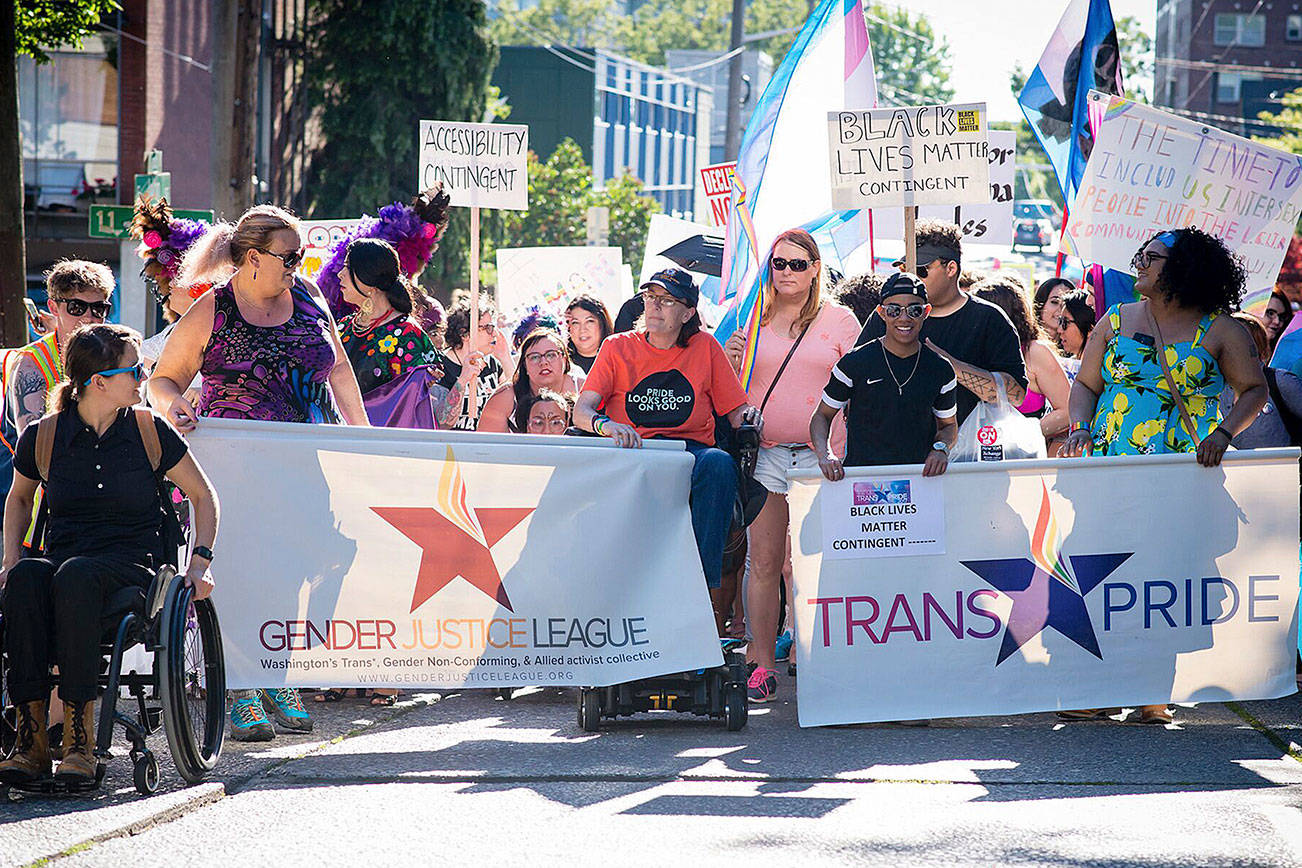Trans Pride Seattle is unavoidably political, harkening back to the early days of the LGBTQ liberation movement. The 1969 Stonewall riots that followed the police raid on the New York City gay and trans bar set the path for modern-day Pride parades. Trans Pride Seattle, produced by local nonprofit Gender Justice League, distinguishes itself from the main Pride parade in that it’s a political march that seeks to increase transgender and non-binary visibility. “We still go back to our radical roots to the fact that Pride was originally a riot,” said Alyson McManus, social-media specialist at Gender Justice League.
Trans Pride Seattle aims to be a safe space where everyone can elevate and celebrate marginalized voices. “A lot of trans people don’t necessarily feel welcome, or don’t feel comfortable going to the big Pride because it’s so big now,” she said. “A lot of cis-gendered people—even gay and lesbian people—are still not necessarily the most nice to trans people.” Transgender erasure can still be seen in efforts to remove the ‘T’ from the LGBT acronym, for instance.
In its sixth year, Trans Pride Seattle continues to strengthen the transgender and non-binary community in Seattle and throughout the world. But financial pressure caused by budget cuts has made their work all the more necessary. Although Gender Justice League has always used crowdfunding to put on the march, it’s had to ramp up fundraising efforts this year, since executive director Danni Askini has had medical issues that have prevented her from doing as much fundraising as she had in years past.
Crowdfunding has also become essential in light of the federal administration’s slashes to funding for HIV prevention and housing-discrimination education. “These sources made up nearly 25 percent of Trans Pride Seattle’s funding,” stated the Trans Pride Seattle 2018 GoFundMe site. “Other ‘mainstream’ funding continues to be extremely hard for us to access—we receive no city or county funds,” it continued. Unlike the Seattle Pride Parade, which is sponsored by Amazon, Facebook, Microsoft, and others, Trans Pride Seattle doesn’t accept major corporation sponsorships. Funds will only be accepted from other nonprofit organizations, individual donors, labor unions, local businesses, and employee resources groups.
The organization has also fielded more direct service requests for housing and assistance in health-care coverage over the past year, which has put further financial strain on the organization. “There’s a lot more people coming to us now because of the current administration and losing funding in other things,” McManus said.
But with the help of GoFundMe, the organization has nearly reached its $50,000 goal, with pledges amounting to nearly $46,000 as of Tuesday morning. The funding will help the organization highlight speakers and performers of marginalized communities who are affected by transphobia, racism, xenophobia, and ableism at Trans Pride Seattle. American Sign Language and Spanish translations will also be provided throughout the events.
This year’s march will focus on national policies that have had ripple effects on local people, such as FOSTA (the new law that penalizes websites for hosting advertisements for sex workers), Deferred Action for Childhood Arrivals, and the Trump administration’s trans military ban. “We feel very connected to other communities that are also marginalized voices,” said McManus.
Attendees can assemble at the intersection of Broadway E and E Thomas Street on Friday, June 22 starting at 5 p.m. The march through Capitol Hill begins at 6 p.m. After the march, festivities run at Cal Anderson Park from 6:45 to 10 p.m., featuring local and national performers including Laith Ashley, Shea Diamond, Randy Ford, and Jade Dynasty.
“Some people ask if [cis-gender] people are welcome. Yes, of course,” said McManus. “We love our allies.”
Update: A previous version of the article listed the incorrect assembly location and the number of years the march has run. It has been corrected.








